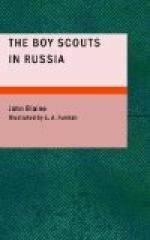“Within the village limits you will be as free as if you were at home, in your own country. You will not be allowed to pass them, however, and if you try to do so a sentry will shoot you. As soon as certain movements are completed, you will be at liberty to pass on, on your way to Koenigsberg. I will add to Lieutenant Ernst’s advice. When you reach Koenigsberg, after you have reported yourself to the police, wait there until a train can take you to Berlin. It will mean only a few days of waiting, for at Koenigsberg there are already many refugees, and the authorities want to get them to Berlin as soon as the movements of troop trains allow the railway to be reopened for passenger traffic.”
Fred agreed to all this. There was nothing else for him to do, for one thing, and, for another, he was by no means unwilling to see whatever there might be to be seen here. He could guess by this time that without any design he had stumbled on a spot that was reckoned rather important by the Germans, for the time being at least, and he had heard enough about the wonderful efficiency of the German army to be anxious to see that mighty machine in the act of getting ready to move.
He did see a good deal, as a matter of fact, that day and the next. It was on the famous Saturday night of the first of August that he had left Virballen. Sunday brought news of a clash with France, far away on the western border, and of the German invasion of Belgium. Monday brought word of a definite declaration of war between Germany and France, and of the growing danger that England, too, might be involved.
And all of Sunday and all of Monday supplies of all sorts poured through the little village in an unceasing stream. Motor cars and trucks were to be seen in abundance, and Fred caught his first glimpse, which was not to be his last, of the wonderful German field kitchens, in the mighty ovens of which huge loaves of bread were being baked even while the whole clumsy looking apparatus was on the move. But it only looked clumsy. Like everything else about the German army, this was a practical and efficient, well tried device.
Then suddenly, early on Tuesday, he was told that he was free to go, or would be by nightfall. And that day all signs of the German army, save a small force of Uhlans, vanished from the village. That evening, refreshed and ready for the road again, Fred set out. And that same evening, though he did not know it until the next day, England entered the war against Germany.
CHAPTER III
A STRANGE MEETING
As he walked west Fred noticed, even in the night, a change in the country. It was not that he passed once in a while a solitary soldier guarding a culvert, as he neared a railway, or a patrol, with its twinkling fire, watching this spot or that that needed special guarding. That was part of war, the part of war that he had been able to foresee. It wasn’t anything due to the war that made an impression on his mind so much as a sort of thickening of the country. Though he had traveled so short a distance from the Russian border, there seemed to be more people about.




